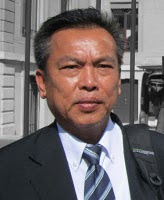KOTA KINABLU (Sabah Malaysia): State Reform Party (STAR) said that with a higher oil
royalty of 50% for Sabah, the state wouldn't even need anymore federal
allocation.
STAR's Deputy Chairman, Daniel John Jambun said this in response to
the query by Sabah Barisan Nasional secretary Datuk Abdul Rahman Dahlan who
expressed worry that Sabah would be worse off than what it is in now should the
federal government under the Malaysia Plan be reduced.
 |
| DANIEL JOHN JAMBUN |
"Abdul Rahman is forgetting that under the 10th Malaysia plan,
Sabah and Sarawak combined are getting only about RM9 billion as compared to
about RM100 billion for the Peninsular," Jambun pointed out. "At this
rate of allocation, Sabah is actually getting less than RM1 billion per year
throughout the five-year Malaysia Plan. As such, the federal allocations are
not much and hardly fulfil all the development needs of Sabah."
Jambun also said that if the BN government is replaced by the opposition
in Sabah, the state will also be asking for the original promised right to
allow it to collect and manage its own revenues, including taxes. "Taxes
collected from Sabah alone amounts from RM15 to RM20 billion per year so just
imagine how much we are losing at the moment," he said. "So combined
that with the retention of income from oil by way of 50% royalty, the income
for Sabah per year would be in the tens of billions per year. So why would we
need anymore allocation from Sabah?"
He said with such a huge revenue base, Sabah would be able to take care
of its own education, health and even security costs. "In fact Sabah would
be a very rich state and would reach a developed status within a decade or
two," he added. "So it is a pity that the BN leaders still have this
outdated thinking that we must depend on the federal government forever to
develop, whereas the real solution is right in our own backyard."
He reminded that many other revenues which should rightly belong to
Sabah are being taken to Kuala Lumpur, such as the revenue collected by the
immigration department, which the 20 Points gave us the guarantee that the
power of immigration would remain in Sabah’s hands.
“From this we can easily explain why Sabah Sabah and Sarawak are the
poorest and second poorest states respectively in Malaysia,” Jambun said. “The
situation of the two states is made even worse when compared with Brunei which
stayed out from Malaysia at the 11th hour in a dispute over oil revenues, and
Singapore which was kicked out from the Federation in 1965 after two years. So
why should Sabah and Sarawak accept an oil deal which Brunei was not willing to
accept?”
Jambun added that a study of the total revenue picture in Sabah and Sarawak would show that Malaya is treating and exploiting the two states as colonies. “This must be brought to the attention of the UN's 24-nation Committee on Decolonisation. This is the committee that asked Britain to leave Sabah, Sarawak, Brunei and Singapore,” he stressed. “A comparison of oil-and-gas revenue sharing between producing provinces/states/regions and central authorities elsewhere in the world would show that Putrajaya is virtually stealing, and at gunpoint, the energy resources that rightfully belong to Sabah and Sarawak for their industrialisation and economic development.
“The raw materials are now being channelled mostly to the non-oil states in Malaysia by way of oil refineries, petrochemical plants and the like. Rightly, oil royalty or no oil royalty, the oil and gas produced from Sabah and Sarawak should stay within the two states for their industrialisation and economic development, for downstream diversification and for socio-economic integration.”
Jambun added that a study of the total revenue picture in Sabah and Sarawak would show that Malaya is treating and exploiting the two states as colonies. “This must be brought to the attention of the UN's 24-nation Committee on Decolonisation. This is the committee that asked Britain to leave Sabah, Sarawak, Brunei and Singapore,” he stressed. “A comparison of oil-and-gas revenue sharing between producing provinces/states/regions and central authorities elsewhere in the world would show that Putrajaya is virtually stealing, and at gunpoint, the energy resources that rightfully belong to Sabah and Sarawak for their industrialisation and economic development.
“The raw materials are now being channelled mostly to the non-oil states in Malaysia by way of oil refineries, petrochemical plants and the like. Rightly, oil royalty or no oil royalty, the oil and gas produced from Sabah and Sarawak should stay within the two states for their industrialisation and economic development, for downstream diversification and for socio-economic integration.”
Tiada ulasan:
Catat Ulasan